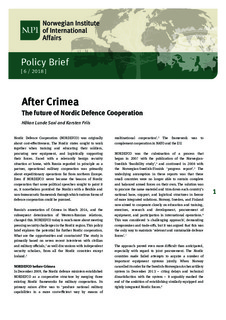| dc.description.abstract | Nordic Defence Cooperation (NORDEFCO) was originally about cost-effectiveness. The Nordic states sought to work together when training and educating their soldiers, procuring new equipment, and logistically supporting their forces. Faced with a relevantly benign security situation at home, with Russia regarded in principle as a partner, operational military cooperation was primarily about expeditionary operations far from northern Europe. Even if NORDEFCO never became the beacon of Nordic cooperation that some political speeches sought to paint it as, it nonetheless provided the Nordics with a flexible and non-bureaucratic framework through which various forms of defence cooperation could be pursued.
Russia’s annexation of Crimea in March 2014, and the subsequent deterioration of Western-Russian relations, changed this. NORDEFCO today is much more about meeting pressing security challenges in the Nordic region. This policy brief explores the potential for further Nordic cooperation. What are the opportunities and constraints? The study is primarily based on seven recent interviews with civilian and military officials, as well discussions with independent security scholars, from all the Nordic countries except Iceland. | nb_NO |
